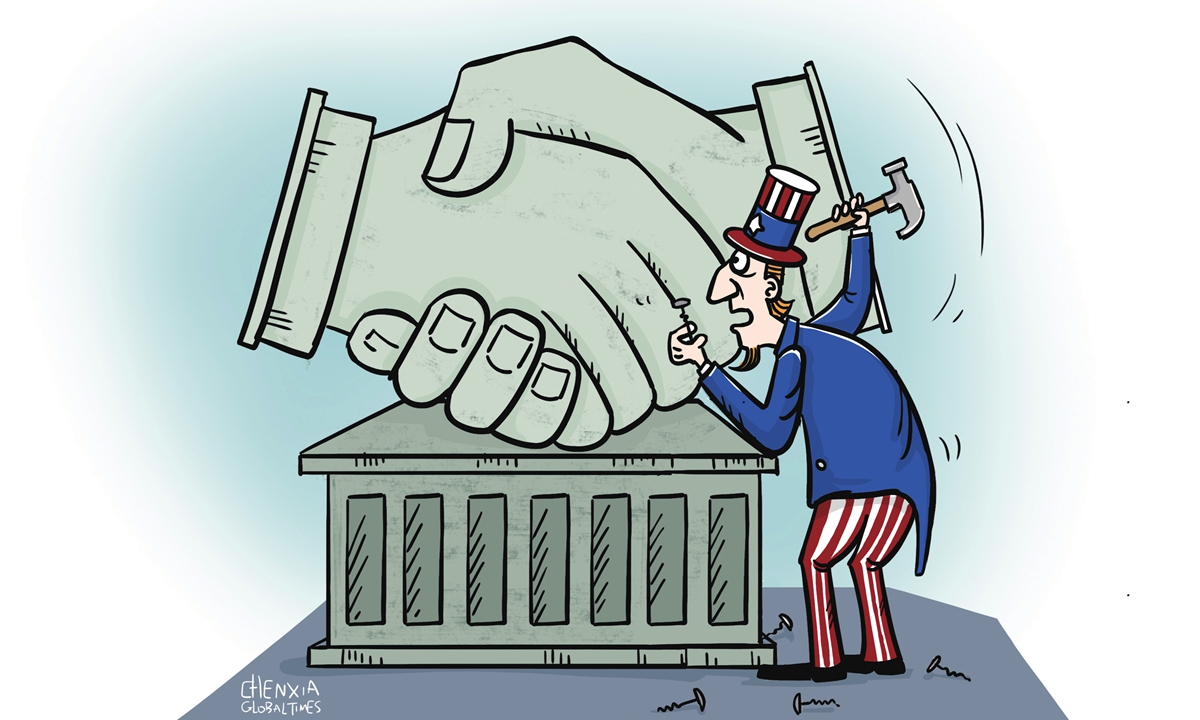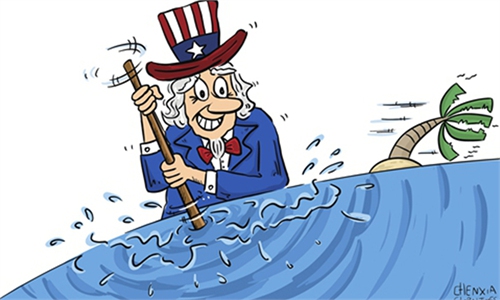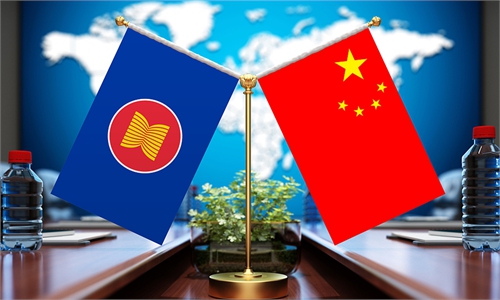
Illustration: Chen Xia/GT
This year marks the 30th anniversary of the establishment of China-ASEAN Dialogue Relations. The current external environment is quite unfriendly to China. The US is intensifying its formation of a "chorus" to suppress China under its Indo-Pacific Strategy.ASEAN, occupying a significant geostrategic position, will never be neglected by the US. After Joe Biden took office, Deputy Secretary of State Wendy Sherman, Secretary of Defense Lloyd Austin and Vice President Kamala Harris have visited the region one after another. Biden, unlike his predecessor Donald Trump, also attended the US-ASEAN summit via video link.
However, the relationship between China and ASEAN has been no longer what it used to be. Even if the US exerts further pressure, it will be difficult for Washington to force the ASEAN members to take sides. Besides ASEAN'S long-held balance policy, the following factors also matter a lot.
First, the bond of interest between China and ASEAN has been further strengthened. At present China and ASEAN have become the largest trading partner of each other. Data from ASEAN shows its trade volume with China in 2020 was $684.6 billion. In terms of investment, according to data released by the China-ASEAN Business Council, the overall foreign investment in ASEAN memebrs declined in 2020. However, China's direct investment in ASEAN increased by 52.1 percent, with increases in Brunei by 182.8 percent, Philippines by 132.1 percent and Singapore by 104.7 percent.
Second, ASEAN has a clearer awareness of the damage to small countries brought about by competition among big powers. As the saying goes, when elephants fight, it is the grass that suffers. This has always been the consensus of Southeast Asian strategists. Therefore, they are unwilling to involve ASEAN in any potential China-US conflicts. Singapore is typical of them. Prime Minister Lee Hsien Loong admitted in an interview with the BBC in March that Singapore could not afford to take sides. ASEAN members including Indonesia and Malaysia have also expressed their concerns to the AUKUS agreement.
Third, the US abandonment of Afghanistan is likely to have a long-lasting influence on ASEAN's diplomatic mentality. The importance of regions and related issues will always change in America's foreign policy agenda. A cruel fact is that the US will always adhere to its own interests at critical moments. ASEAN members should know this well, and it seems they do.
Fourth, the US now has fewer cards to stir up trouble in Southeast Asia. When Austin visited Vietnam, he promised to help Hanoi enhance its "maritime security capabilities." However, China-Vietnam relations are multidimensional. Whereas economy, trade and ideology are strong bonds that maintain the stability of China-Vietnam bilateral relations, a calculative Vietnam would not be easily deluded by the US. In the Philippines, Philippine President Rodrigo Duterte has actually shelved the so-called South China Sea arbitration matter. In the upcoming general election, Bongbong Marcos, who holds a pragmatic attitude toward China, has become the most popular candidate rather than the tough vice president Leni Robredo.
China should still be particularly vigilant about the US attempts to undermine China-ASEAN relations by manipulating the South China Sea issue. The US may still use political, economic or even intelligence means to influence the policy trends of relevant ASEAN members. It may also resort to the so-called navigation of freedom in the South China Sea to stimulate the sensitive nerves of nationalists in Southeast Asian countries.
Fortunately, with the joint efforts that China and ASEAN have made, bilateral relations between the two sides have generally become more mature with stronger anti-risk and anti-interference capabilities although there are still many challenges. President Xi Jinping will attend and chair the ASEAN-China Special Summit to Commemorate the 30th Anniversary of ASEAN-China Dialogue Relations in Beijing on Monday. This summit is believed to inject vitality into China-ASEAN bilateral relations. ASEAN in the future is expected to adhere to its own interests more firmly instead of tying itself to the US chariot against China.
The author is research fellow and deputy director at the Institute of International Relations of the Shanghai Academy of Social Sciences. opinion@globaltimes.com.cn


